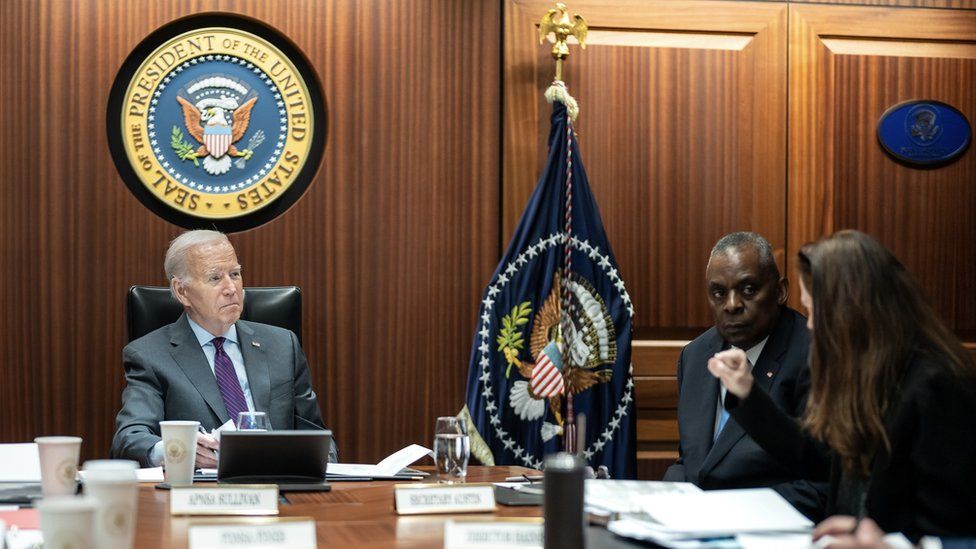ARTICLE AD BOX
 Image source, President Joe Biden
Image source, President Joe Biden
By Sarah Smith
North America editor
The deaths of three American soldiers - two women and a man from the US state of Georgia - in a drone attack in Jordan on Sunday was exactly what the Biden administration was dreading.
And it means the White House now faces an extremely difficult decision over how to respond.
President Biden, who met his national security team in the Situation Room on Monday, is currently weighing the options before him. He could choose to strike Iran-allied targets in the region, hit Iran itself, or do nothing at all.
All options come with serious risk, especially in an election year where the president has to balance looking strong with ensuring an already dangerous situation does not spin out of control.
"We don't want a wider war with Iran," National Security Council Spokesman John Kirby told reporters. "We don't want a wider war in the region, but we've got to do what we have to do."
The Biden administration also has to consider its response to Iran in the context of the ongoing war between Israel and Hamas.
Since 7 October, the US's main priority has been to stop the conflict in Gaza from spreading in the region. That's what governed the carefully calibrated American responses to the previous non-fatal attacks on its forces in region.
This deadly attack completely changes the equation - the US now feels like it has no choice but to respond forcefully. Yet the need to strike a delicate balance remains.
So President Biden needs to find a course of action that sends a much more robust message of deterrence, without causing the very escalation they've been working so hard to avoid.
Mr Biden's political rivals - by virtue of being out of power - face no such dilemma.
Donald Trump, the clear frontrunner in the race to pick a Republican presidential candidate, set the tone with a Sunday night post on social media that laid the blame squarely on the president.
"This brazen attack on the United States is yet another horrific and tragic consequence of Joe Biden's weakness and surrender," Mr Trump wrote.
The former president did not say, however, how he would respond if he was in office and he has not commented further. Other Republicans have not held back.
Senator Tom Cotton said "the only answer to these attacks must be devastating military retaliation". Anything less, he added, would confirm the president was a "coward".
The leading Republican in the Senate, Mitch McConnell, called for "serious, crippling cost to Iran". Senator Lindsay Graham said the US should "strike targets of significance inside Iran".
But leading Democrats did not go as far - most called for those responsible to be held accountable and for the US to target Iran-backed groups rather than the country itself.
"This attack… cannot go unanswered," Senator Ben Cardin, chair of the Senate Foreign Relations Committee, said. "I support President Biden in a deliberate and proportionate response."
Democratic Senator Richard Blumenthal used similar language, writing on X that "a strong, surgical response is vital against Iran-backed forces".
The Biden administration has said its decision on how to respond will not be based on polls or the looming election. "He's not looking at political calculations," John Kirby told reporters.
But in an election year, any foreign policy decision is inevitably influenced by domestic politics. How will military action - or inaction - be perceived by American voters?
It is often assumed that foreign policy plays a minor part on the decisions voters make about who they want as their president. But with conflicts in the Middle East and Ukraine, polls suggest it is important for more voters this year.
The details of this particular attack may well have faded by November when Americans go to the polls - but people do care about the image they think their nation projects in the world.
I've heard voters across America tell me they are concerned that the US looks weak these days. They like Donald Trump's promise of strong-man-leadership that will mean no other country would dare to try push America around.
Obviously it is much easier to talk about military strategy and global diplomacy on the campaign trail than it is inside the White House situation room.
Joe Biden, meanwhile, is faced with a delicate and dangerous decision that could have far-reaching consequences in the Middle East. But his response could also have repercussions closer to home in what is a high-stakes election year.

 11 months ago
79
11 months ago
79








 English (US) ·
English (US) ·